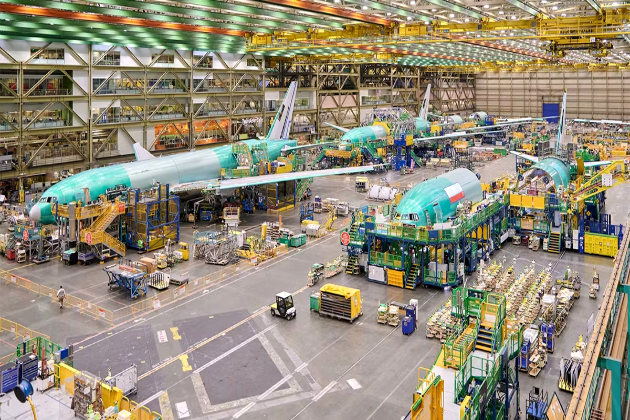Four ways the UK economy is being hampered by the private sector
The Conversation
25 Mar 2023, 00:09 GMT+10

The UK government has decided to go ahead with a rise in corporation tax in April 2023. The move is a clear reversal of the tax reduction which previous chancellors hoped would encourage output and innovation.
The idea of lowering corporation tax to boost growth (and ultimately tax revenue) failed spectacularly under Liz Truss's short-lived premiership. And as the current chancellor Jeremy Hunt explained in his recent budget: "Even at 19%, our corporation tax regime did not incentivise investment as effectively as countries with higher headline rates."
In raising corporation tax to 25%, the government has conceded that companies have not been investing productively. Despite corporation tax rates falling to 19% from 28% in 2010, and historically low borrowing costs (with interest rates close to zero to help businesses recover from the 2008 global financial crisis), business investment took until 2016 to recover to its pre-crisis share of GDP, which was already low in comparison to the EU.
Corporate Britain preferred to either save its profits, or pay out dividends to shareholders, revealing four deep rooted structural problems behind the UK's growth problem.
1. Profits don't guarantee more investment
Research shows that larger firms in the UK are more cautious about any boost in profits, compared to their counterparts in the EU. It takes an unusually large profit boost to give them an incentive to invest.
Investment may also be depressed by the increase in the number of firms whose profit relies on securing intellectual property rights, particularly in sectors like pharmaceuticals and software, where these are strongly protected. As these rights raise profits by restricting access to the market to new products, they can lessen the incentive for companies to invest in more production.
It is an extension of what's known as the "innovators' dilemma", where market leaders hesitate over developing new products that could take away sales and profits from their current range.
Business strategists often advise that when capital costs are unusually low - as in the UK's low interest rate phase from 2008 to 2020 - it's best to lessen the focus on profit and instead go for growth. But with interest rates now rising, much of UK plc has left it too late.
2. Higher investment hasn't driven faster growth
In 2016, when UK business investment finally recovered to levels similar to those before the 2008 financial crisis (around 10% of GDP), growth didn't pick up as conventional forecast models had expected.
Trends are worsening further as the recovery from the devastating impact of COVID stalls. One cause appears to be what's referred to as "financialisation": when non-financial firms chase profit through financial and real estate investment, instead of spending on more productive new equipment and innovation. But this is often risky when interest rates rise or asset prices fall.
3. Defending profits can fuel inflation
Ministers and the Bank of England have urged employees to keep pay rises below inflation, to avoid a "wage push" that might keep inflation high. Though many protested in an ongoing strike wave, on the whole, wages have not matched inflation. In the year to January employees got an average wage rise of 7% in the private sector and just 4.8% in the public, compared to consumer price inflation of 10.1%.
In contrast, the speed with which companies raised prices to match (or even exceed) their rise in costs, suggests the "profit push" has been stronger than any wage push in driving inflation upwards.
UK firms have done better than their employees at protecting income against the rising cost of living. But because they won't return the favour, and invest to improve productivity and let wages rise, the chancellor has chosen to tax those profits more and spend the proceeds himself.
4. Public investment needs a kick-start
Chancellors since 2014 have done well to avoid the mistake of letting public investment fall when private investment is still subdued after a crisis.
But current fiscal targets designed to stabilise UK public debt inevitably mean a squeeze on public projects (outside healthcare and defence where increases have been pledged). The latest OBR forecasts show general government fixed investment slowing from 12.3% growth this year to just 0.4% in 2024, followed by falls of 3.3%, 1.1% and 1.4% in the years that follow.
This squeeze is being worsened by the runaway costs of HS2, now more than twice its original Pound 33 billion projection, and other over-budget mega-projects such as Hinckley Point C, which take funds from more prosaic outlays on crumbling transport, energy, education and healthcare infrastructure.
The government's spring budget envisages central government co-investing in emerging technologies such as artificial intelligence, carbon capture and small nuclear reactors. But under its self-imposed investment restrictions, the state will struggle to fund its new entrepreneurial role. And the current government's desire to be seen as "pro-business" cannot hide its profound irritation that the private sector didn't step up its investment performance while the funds were still flowing freely.
Author: Alan Shipman - Senior Lecturer in Economics, The Open University 
 Share
Share
 Tweet
Tweet
 Share
Share
 Flip
Flip
 Email
Email
Watch latest videos
Subscribe and Follow
Get a daily dose of The UK News news through our daily email, its complimentary and keeps you fully up to date with world and business news as well.
News RELEASES
Publish news of your business, community or sports group, personnel appointments, major event and more by submitting a news release to The UK News.
More InformationBusiness
SectionBoeing links worker bonuses to company-wide performance
SEATTLE, Washington: Boeing has revamped its employee incentive plan, tying annual bonuses for more than 100,000 workers to overall...
US, Canadian farmers face rising fertilizer costs amid trade tensions
WINNIPEG, Manitoba: Farmers in the U.S. and Canada are bracing for soaring fertilizer prices as trade tensions escalate between the...
U.S. stocks stabilize after relentless losses
NEW YORK, New York - A slightly lower-than-expected CPI reading for February helped U.S. stocks to stabilize after some relentless...
New York office market rebounds as big investors hunt for deals
NEW YORK CITY, New York: New York's office market is showing signs of a comeback as major investors, including Blackstone, scout for...
Micro-wineries in Cyprus bring ancient Commandaria wine back to life
NICOSIA, Cyprus: Cyprus' ancient Commandaria wine, praised for its rich heritage dating back nearly 3,000 years, is making a comeback...
DoorDash, Williams-Sonoma, and others soar on S&P 500 inclusion
SAN FRANCISCO, California: Shares of DoorDash, Williams-Sonoma, Expand Energy, and TKO Group surged in extended trading on March 7...
Soccer
Section"It was one of the hard-fought games": HFC interim head coach Shameel Chembakath said after 1-1 draw against KBFC
Hyderabad (Telangana) [India], March 13 (ANI): Hyderabad FC interim head coach Shameel Chembakath described the match against Kerala...
"Silly things happen, and we have to work as a team to overcome all these": KBFC interim head coach TG Purushothaman after 1-1 against HFC
Hyderabad (Telangana) [India], March 13 (ANI): Kerala Blasters FC interim head coach TG Purushothaman expressed his disappointment...
(SP)SPAIN-MADRID-FOOTBALL-UEFA CHAMPIONS LEAGUE-ATLETICO DE MADRID VS REAL MADRID
(250313) -- MADRID, March 13, 2025 (Xinhua) -- Antonio Rudiger of Real Madrid celebrates after the UEFA Champions League Round of 16...
Shanghai Shenhua overwhelmed by Kawasaki Frontale in AFC Champions League
Shanghai Shenhua's Saulo Mineiro (front) goes for goal during the AFC Champions League round of 16 second leg against Kawasaki Frontale...
(SP)SPAIN-BARCELONA-FOOTBALL-COPA DE LA REINA-BARCELONA VS REAL MADRID
(250313) -- BARCELONA, March 13, 2025 (Xinhua) -- Kika Nazareth (R) of Barcelona vies with Maelle Lakrar of Real Madrid during the...
Argentines protesting austerity measures clash with police
BUENOS AIRES, ARGENTINA — Argentine retirees and fans of several soccer teams clashed with police Wednesday during a protest in front...













